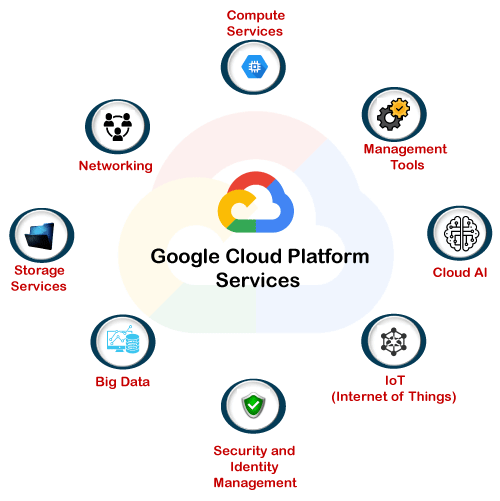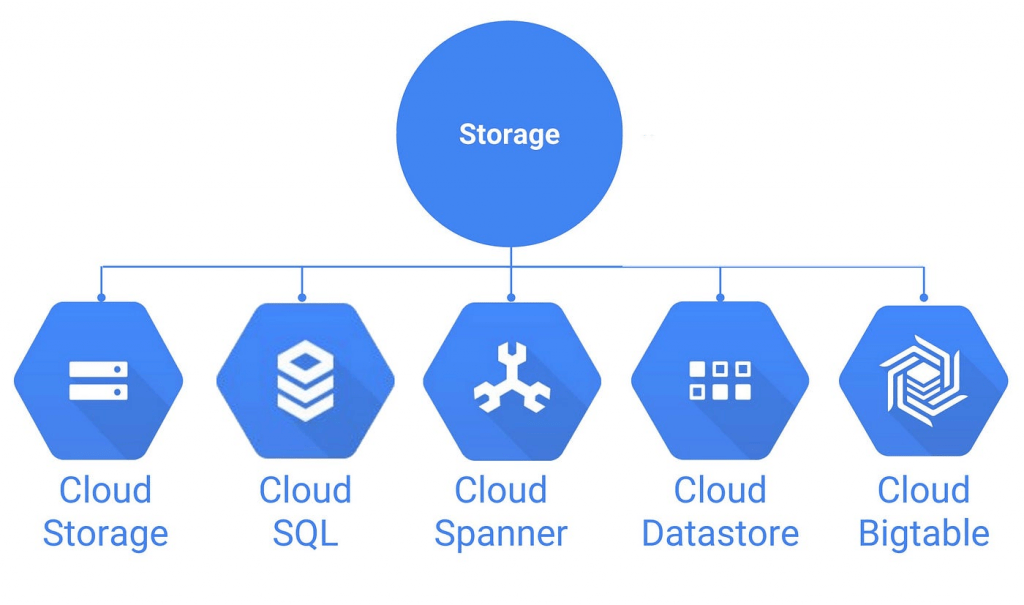
- Overview of Google Cloud Platform
- GCP Core Services and Components
- GCP Networking and Security
- Compute Engine in GCP
- GCP Storage Solutions
- GCP IAM and Security Management
- GCP for Machine Learning and AI
- Conclusion
Overview of Google Cloud Platform
Google Cloud Platform (GCP) is a comprehensive suite of cloud computing services offered by Google, designed to provide businesses, developers, enterprises, and governments with a wide range of infrastructure, platform, and software solutions. GCP offers Infrastructure as a Service (IaaS), Platform as a Service (PaaS), and Software as a Service (SaaS), making it a highly flexible and scalable cloud platform. This enables organizations to host applications, store data, run virtual machines, and take advantage of advanced services in areas such as machine learning, big data, and Internet of Things (IoT). With Google Cloud Platform Training, businesses can tap into Google’s robust and reliable cloud infrastructure to scale their operations seamlessly, while also benefiting from innovative tools for data analytics and real-time insights. GCP’s extensive range of services ensures that organizations have everything they need to build, manage, and optimize applications, regardless of the complexity or size. Furthermore, Google’s vast global network, which spans multiple regions and data centers, ensures low-latency, high-performance services, enabling organizations to deliver consistent and reliable user experiences on a global scale.
GCP Core Services and Components
Google Cloud Platform (GCP) offers a wide array of core services and components designed to support various applications, including infrastructure, data processing, machine learning, and more. Below are 15 core services and components within GCP Provides scalable virtual machines for running applications in Understanding GCP Analytics.A fully managed platform for building and deploying applications without managing the underlying infrastructure.Manages and orchestrates containerized applications with Kubernetes.A serverless compute service for executing code in response to events.Object storage service for storing and retrieving any amount of data at any time.A fully managed, serverless data warehouse for running fast SQL queries on large datasets.A messaging service that allows for real-time event ingestion and delivery.A globally distributed relational database service for mission-critical applications.A NoSQL document database for building web and mobile apps.Managed relational database service supporting MySQL, PostgreSQL, and SQL Server.Scalable Domain Name System (DNS) service for reliable and low-latency DNS resolution.
Gain in-depth knowledge of Google Cloud Platform by joining this Google Cloud Trainig now.
-
Compute Services:
- Google Compute Engine (GCE): Virtual machines (VMs) running on Google’s infrastructure.
- Google Kubernetes Engine (GKE): Managed Kubernetes service for deploying and managing containerized applications.
- Google App Engine: Platform as a Service (PaaS) for building and deploying applications without managing infrastructure. Storage Services:
- Google Cloud Storage: Object storage service that provides high scalability and durability for unstructured data.
- Persistent Disks: Block storage that can be attached to Compute Engine VMs for storing data. Networking:
- Google Cloud Virtual Network: Networking solution for creating isolated networks, managing subnets, IP addresses, and firewall rules.
- Cloud Load Balancing: Distributes incoming traffic across resources for optimal performance and reliability.

-
Big Data and Analytics:
- BigQuery: A serverless, highly scalable data warehouse for running fast SQL queries on Understanding the Cloud Native Applications.
- Dataflow: Managed service for stream and batch processing of data.
- Pub/Sub: Messaging service for building event-driven architectures and real-time analytics. AI and Machine Learning:
- TensorFlow on GCP: Open-source platform for machine learning, which can be run on GCP for scalable deep learning tasks.
- AI Hub: A repository for machine learning components and pipelines. Identity and Security:
- Identity and Access Management (IAM): Allows you to define who has access to GCP resources and what they can do.
- Cloud Security Command Center: Provides a comprehensive view of the security posture .
- Custom Machine Types: Choose the number of virtual CPUs and amount of memory that suits your application’s requirements, ensuring cost-efficiency.
- Preemptible VMs: Cost-effective instances that can be shut down at any time, ideal for batch processing and non-critical workloads.
- Automatic Scaling: GCE supports auto-scaling, enabling instances to automatically scale up or down based on load.
- Integrated Security: GCE integrates with IAM and other security features like Google Cloud Firewall to ensure that your VMs and applications are GCP Security Key Concepts. Use Cases:
- Running web applications, databases, and legacy applications.
- Hosting scalable microservices and containerized applications with Google Kubernetes Engine (GKE).
- High-performance computing (HPC) for scientific simulations or large-scale data processing.
- IAM Roles and Policies: GCP uses IAM to grant permissions to users, groups, and service accounts. Permissions are assigned via roles, which can be customized or predefined (e.g., Viewer, Editor, Owner). This ensures that only authorized users have access to specific resources.
- Service Accounts: Service accounts are used to represent applications or virtual machines when accessing GCP resources. They can be assigned specific roles to manage their access.
- Security Key Management: GCP offers Cloud Key Management for managing cryptographic keys, including encryption at rest. It integrates with IAM to manage who can access encryption keys.
- Audit Logging: Cloud Audit Logs track all Google Cloud Platform and provide an audit trail of access to resources. This is useful for monitoring and identifying unauthorized access or changes to cloud resources.
- Multi-Factor Authentication (MFA): GCP provides support for MFA, adding an extra layer of security by requiring users to verify their identity through multiple methods (e.g., SMS or Google Authenticator). Solutions:
- Implement least-privilege access principles using IAM roles.
- Regularly audit access and permissions using Audit Logs.
- Use Cloud Identity for managing user identities and authentication.
- AI and ML APIs: GCP offers pre-trained APIs, Speech-to-Text, Translation, and Natural Language, enabling businesses to add AI capabilities to apps without machine learning expertise.
- TensorFlow on GCP: TensorFlow, an open-source ML framework developed by Google, is widely supported on GCP. You can train and deploy TensorFlow models using Google AI Platform or Kubernetes Engine.
- AI Platform: AI Platform is a fully managed service for building, training, and deploying machine learning models. GCP Career Opportunities Growth Guide integrates with Google’s ML frameworks and provides tools for versioning, training, and optimization.
- BigQuery ML: BigQuery ML allows users to build and train machine learning models directly within BigQuery, making it easier to analyze large datasets and create predictive models using SQL queries.
- AutoML: AutoML offers a suite of tools that allow developers to build custom machine learning models without requiring deep expertise in machine learning. It’s ideal for tasks like image classification, text analysis, and translation. Use Cases:
- Predictive Analytics: Using ML models to predict future trends, customer behavior, or sales.
- Image Recognition: Detecting objects or identifying products in images.
- Natural Language Processing (NLP): Analyzing customer feedback or documents.
Start your journey in Google Cloud Platform by enrolling in this Google Cloud Training .
GCP Networking and Security
Google Cloud Platform (GCP) provides robust networking and security services to ensure the protection and high availability of applications and data. Networking features include Virtual Private Cloud (VPC), which allows users to create isolated networks and manage IP ranges, routing, and subnets.It ensures reliable performance by distributing traffic across multiple regions, while Cloud Interconnect offers private, dedicated network connections for high-throughput, low-latency data transfers. Cloud CDN enhances global content delivery with low latency. On the security front, GCP features Identity and Access Management (IAM) for role-based access control, Cloud Security Command Center (SCC) for visibility into security vulnerabilities, and Cloud Armor to protect applications from DDoS attacks. Additionally, GCP provides data encryption both at rest and in transit, ensuring sensitive data remains secure.
Compute Engine in GCP
Google Compute Engine (GCE) is the IaaS offering of Google Cloud, providing users with scalable, flexible, and high-performance virtual machines (VMs). GCE allows you to run applications and services on virtualized hardware with customizable resources, offering complete control over your VMs and infrastructure.
-
Key Features:
Take charge of your Cloud Computing career by enrolling in ACTE’s Cloud Computing Master Program Training Course today!
GCP Storage Solutions
Google Cloud Platform (GCP) offers a diverse range of storage solutions to cater to various workload needs, from large-scale data storage to low-latency access. Google Cloud Storage (GCS) is an object storage service designed for storing and retrieving unstructured data, such as images, videos, backups, and datasets. It provides multiple storage classes like Standard, Nearline, Coldline, and Archive, offering cost-effective options for long-term storage. For high-performance and scalable storage, Persistent Disk provides block storage that can be attached to Google Compute Engine instances, offering durability and flexibility as storage needs grow. Filestore is a fully managed file storage service ideal for applications requiring a file system interface, such as NFS-based file systems, making it perfect for database backups, media storage, and file-sharing purposes. Google Cloud Platform Training is a fully managed, scalable relational database service known for its strong consistency, high availability, and global distribution, making it suitable for mission-critical applications. BigQuery Storage is a fast and highly scalable data warehouse designed for running analytics queries on massive datasets with near real-time processing. These storage solutions enable a variety of use cases, including backup and archiving with Google Cloud Storage, database management and file sharing with Persistent Disk and Filestore, and big data analytics and data lakes using BigQuery and Google Cloud Storage.

GCP IAM and Security Management
Identity and Access Management (IAM) in Google Cloud is a critical feature for securing and controlling access to cloud resources.
Preparing for Google Cloud Platform interviews? Visit our blog for the best Google Cloud Interview Questions and Answers!
GCP for Machine Learning and AI
Google Cloud offers a comprehensive set of machine learning (ML) and artificial intelligence (AI) tools to help businesses build, train, and deploy sophisticated models.
Conclusion
In conclusion, Google Cloud Platform (GCP) offers a comprehensive suite of cloud computing services that cater to the needs of developers, enterprises, and governments. With its scalable infrastructure, diverse storage solutions, and advanced tools for machine learning, big data, and IoT, GCP empowers organizations to build, deploy, and manage applications with ease. Google Cloud Platform Training robust networking and security features ensure high availability and data protection, while its flexible compute services, such as Google Compute Engine and Google Kubernetes Engine, provide powerful options for various workloads. Additionally, GCP’s AI and machine learning capabilities enable businesses to leverage cutting-edge technology for predictive analytics, image recognition, and more. With a global network and a strong focus on innovation, GCP continues to evolve, providing the tools necessary for businesses to stay competitive in an increasingly digital world. Overall, GCP stands out as a versatile and reliable cloud platform, making it a strong choice for organizations looking to innovate and scale in the cloud.





